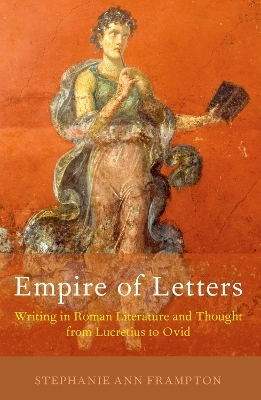
Empire of Letters
Writing in Roman Literature and Thought from Lucretius to Ovid
Seiten
2022
Oxford University Press Inc (Verlag)
978-0-19-765152-0 (ISBN)
Oxford University Press Inc (Verlag)
978-0-19-765152-0 (ISBN)
Shedding new light on the history of the book in antiquity, Empire of Letters tells the story of writing at Rome at the pivotal moment of transition from Republic to Empire (c. 55 BCE-15 CE). By uniting close readings of the period's major authors with detailed analysis of material texts, it argues that the physical embodiments of writing were essential to the worldviews and self-fashioning of authors whose works took shape in them. Whether in wooden tablets, papyrus bookrolls, monumental writing in stone and bronze, or through the alphabet itself, Roman authors both idealized and competed with writing's textual forms.
The academic study of the history of the book has arisen largely out of the textual abundance of the age of print, focusing on the Renaissance and after. But fewer than fifty fragments of classical Roman bookrolls survive, and even fewer lines of poetry. Understanding the history of the ancient Roman book requires us to think differently about this evidence, placing it into the context of other kinds of textual forms that survive in greater numbers, from the fragments of Greek papyri preserved in the garbage heaps of Egypt to the Latin graffiti still visible on the walls of the cities destroyed by Vesuvius. By attending carefully to this kind of material in conjunction with the rich literary testimony of the period, Empire of Letters exposes the importance of textuality itself to Roman authors, and puts the written word back at the center of Roman literature.
The academic study of the history of the book has arisen largely out of the textual abundance of the age of print, focusing on the Renaissance and after. But fewer than fifty fragments of classical Roman bookrolls survive, and even fewer lines of poetry. Understanding the history of the ancient Roman book requires us to think differently about this evidence, placing it into the context of other kinds of textual forms that survive in greater numbers, from the fragments of Greek papyri preserved in the garbage heaps of Egypt to the Latin graffiti still visible on the walls of the cities destroyed by Vesuvius. By attending carefully to this kind of material in conjunction with the rich literary testimony of the period, Empire of Letters exposes the importance of textuality itself to Roman authors, and puts the written word back at the center of Roman literature.
Stephanie Ann Frampton is a classicist, comparatist, and historian of the book in antiquity. She is Associate Professor of Classical Literature at the Massachusetts Institute of Technology.
Acknowledgements
List of Figures
Introduction: More Than Words
Chapter 1: Classics and the Study of the Book
Chapter 2: Writing and Identity
Chapter 3: The Text of the World
Chapter 4: Tablets of Memory
Chapter 5: The Roman Poetry Book
Chapter 6: Ovid and the Inscriptions
Conclusion: Texts and Objects
References
Index locorum
Index
| Erscheinungsdatum | 03.10.2022 |
|---|---|
| Zusatzinfo | 11 |
| Verlagsort | New York |
| Sprache | englisch |
| Maße | 237 x 155 mm |
| Gewicht | 313 g |
| Themenwelt | Literatur ► Klassiker / Moderne Klassiker |
| Geschichte ► Allgemeine Geschichte ► Vor- und Frühgeschichte | |
| Geisteswissenschaften ► Sprach- / Literaturwissenschaft ► Anglistik / Amerikanistik | |
| Geisteswissenschaften ► Sprach- / Literaturwissenschaft ► Literaturwissenschaft | |
| ISBN-10 | 0-19-765152-6 / 0197651526 |
| ISBN-13 | 978-0-19-765152-0 / 9780197651520 |
| Zustand | Neuware |
| Informationen gemäß Produktsicherheitsverordnung (GPSR) | |
| Haben Sie eine Frage zum Produkt? |
Mehr entdecken
aus dem Bereich
aus dem Bereich
Was Pompeji über uns erzählt
Buch | Hardcover (2023)
Propyläen (Verlag)
32,00 €
auf den Spuren der frühen Zivilisationen
Buch | Hardcover (2023)
C.H.Beck (Verlag)
20,00 €


